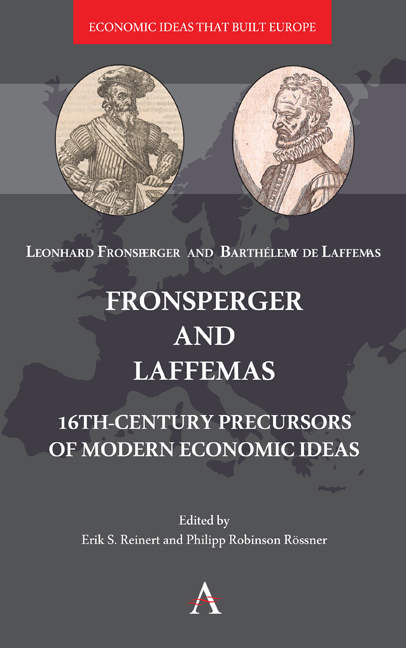Book contents
- Frontmatter
- Contents
- Introduction
- 1 Barthélemy de Laffemas (1545–CA. 1611) as an Early Economist: Context and Scholarly Voices in the English-language Literature
- 2 General Regulation for the Establishment of Manufactures (1597)
- 3 Leonhard Fronsperger (1520–CA. 1575) as an Early Apology of the Market Economy
- 4 Leonhard Fronsperger ‘On the Praise of Self-Interest’ (1564)
Introduction
Published online by Cambridge University Press: 28 February 2024
- Frontmatter
- Contents
- Introduction
- 1 Barthélemy de Laffemas (1545–CA. 1611) as an Early Economist: Context and Scholarly Voices in the English-language Literature
- 2 General Regulation for the Establishment of Manufactures (1597)
- 3 Leonhard Fronsperger (1520–CA. 1575) as an Early Apology of the Market Economy
- 4 Leonhard Fronsperger ‘On the Praise of Self-Interest’ (1564)
Summary
The series Economic Ideas That Built Europe aims at making classical economic texts – first published on the European Continent – available in English. We aim at finding and making available important works that provide insights that are lost in today's mainstream and neoclassical traditions. This tone was set already in the first text published, in 2011: Antonio Serra's A Short Treatise on the Wealth and Poverty of Nations (1613). Serra introduced the dichotomy of increasing and diminishing returns to explain the wealth-creating capacity of manufacturing (operating under increasing returns to scale) and the lack of generalised wealth in countries specialising in activities where one factor of production is limited by nature (agriculture, fisheries, mining) and therefore, after a certain point, are subject to diminishing returns. This counterpoint – a key to understanding the wealth and poverty of nations – is not compatible with equilibrium, and therefore disappeared from mainstream economics in the early 1900s.
We have published first ever English translations of key works on economic policy from Italian, both published in Naples – Antonio Serra (1613) and Carlo Tapia's Treatise on Abundance (1638) – in a period (1503–1707) when the Kingdom of Naples was ruled by the kings of Spain. From German, we published Wilhelm von Hörnigk's highly influential Austria Supreme (if it so wishes) (1684), and from Spanish, Gaspar Melchor Jovellanos’ Report of the Agrarian Law (1795). In addition, we have republished Martin Luther's work On Trade and Usury (1524). The first English translation of Albert Aftalion's Periodic Crises of Overproduction (1913) is forthcoming in this series.
In this volume we combine two small works representing the economics of the 1500s. With a work authored by Barthélemy de Laffemas (1545–1612) we add an important French text, and with Leonhard Fronsperger (ca. 1520–1575) a pioneering German text. Despite their age, these two pragmatic texts still provide important insights.
We are pleased to present the first-ever translation of Barthélemy de Laffemas Reiglement (sic) général pour dresser les manufactures en ce royaume, originally a 40-page booklet, and also a 15-page addition – with questions and answers – entitled Response aux difficultez proposées à l’encontre du règlement général touchant les manufactures. The first work is dated 1597, and Bibliothèque Nationale de France also considers the second work as published in that year.
- Type
- Chapter
- Information
- Fronsperger and Laffemas16th-Century Precursors of Modern Economic Ideas, pp. vi - xPublisher: Anthem PressPrint publication year: 2023



